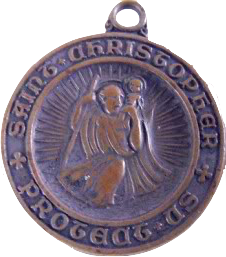Although Vekzhivi's answer is not bad, I think I can add a few things.
The spelling of "cristopher" varies between editions. For example, the Norton Critical Edition of the Canterbury Tales (edited by V. A. Kolve and G. Olson, 1989) has the following line:
A Cristofre on his brest of silver shene.
The editors add that "Cristofre" means "St. Christopher medal".
Nevill Coghill translated the relevant lines as follows:
A medal of St. Christopher he wore
Of shining silver on his breast, (...)
Saint Christopher is or was the patron saint of travellers, but why is this and what made the medal recognisable?
There are several legends related to Saint Christopher; one of them is part of the Golden Legend, compiled by Jacobus de Voragine. See especially the following passage:
Then went Christopher to this river, and made there his habitacle for him, and bare a great pole in his hand instead of a staff, by which he sustained him in the water, and bare over all manner of people without ceasing. (...)
Then he awoke and went out, but he found no man. And when he was again in his house, he heard the same voice and he ran out and found nobody. The third time he was called and came thither, and found a child beside the rivage of the river, which prayed him goodly to bear him over the water.
And then Christopher lift up the child on his shoulders, and took his staff, and entered into the river for to pass. And the water of the river arose and swelled more and more: and the child was heavy as lead, and alway as he went farther the water increased and grew more, and the child more and more waxed heavy, insomuch that Christopher had great anguish and was afeard to be drowned.
And when he was escaped with great pain, and passed the water, and set the child aground, he said to the child: Child, thou hast put me in great peril; thou weighest almost as I had all the world upon me, I might bear no greater burden.
And the child answered: Christopher, marvel thee nothing, for thou hast not only borne all the world upon thee, but thou hast borne him that created and made all the world, upon thy shoulders. I am Jesu Christ the king, to whom thou servest in this work. And because that thou know that I say to be the truth, set thy staff in the earth by thy house, and thou shalt see to-morn that it shall bear flowers and fruit, and anon he vanished from his eyes.
This type of story explains the origin of his name: "Christophoros" or "Christ-Bearer". It also explains why he is the patron saint of travellers.
So a medal of Saint Christopher would be very recognisable, since it would show a man carrying a child on his back, like this medal on Wikimedia:
